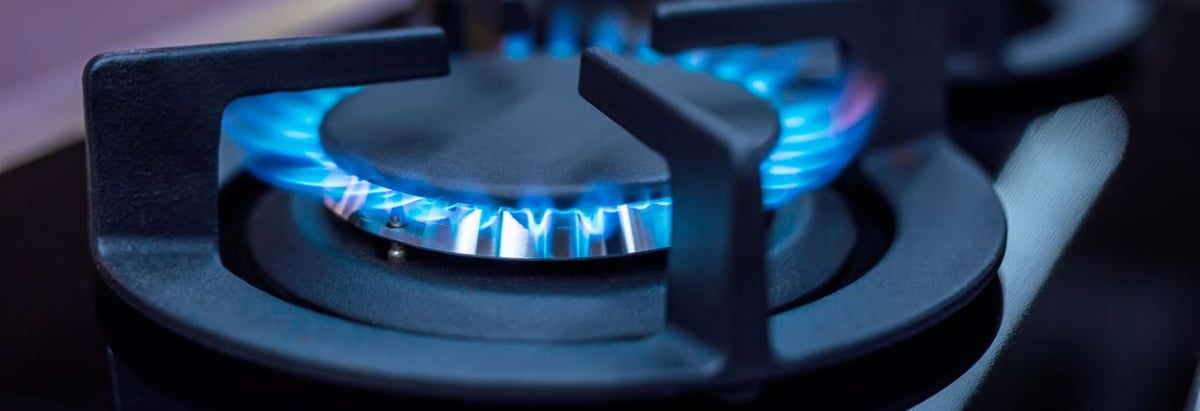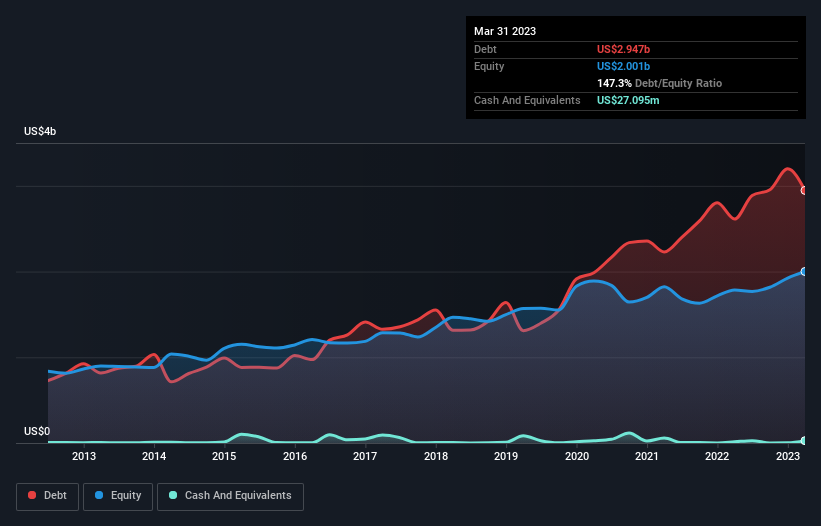- United States
- /
- Gas Utilities
- /
- NYSE:NJR
We Think New Jersey Resources (NYSE:NJR) Is Taking Some Risk With Its Debt

David Iben put it well when he said, 'Volatility is not a risk we care about. What we care about is avoiding the permanent loss of capital.' So it might be obvious that you need to consider debt, when you think about how risky any given stock is, because too much debt can sink a company. As with many other companies New Jersey Resources Corporation (NYSE:NJR) makes use of debt. But the more important question is: how much risk is that debt creating?
Why Does Debt Bring Risk?
Generally speaking, debt only becomes a real problem when a company can't easily pay it off, either by raising capital or with its own cash flow. Part and parcel of capitalism is the process of 'creative destruction' where failed businesses are mercilessly liquidated by their bankers. However, a more common (but still painful) scenario is that it has to raise new equity capital at a low price, thus permanently diluting shareholders. Having said that, the most common situation is where a company manages its debt reasonably well - and to its own advantage. When we think about a company's use of debt, we first look at cash and debt together.
Check out our latest analysis for New Jersey Resources
What Is New Jersey Resources's Debt?
As you can see below, at the end of March 2023, New Jersey Resources had US$2.95b of debt, up from US$2.61b a year ago. Click the image for more detail. Net debt is about the same, since the it doesn't have much cash.

A Look At New Jersey Resources' Liabilities
The latest balance sheet data shows that New Jersey Resources had liabilities of US$711.5m due within a year, and liabilities of US$3.58b falling due after that. Offsetting these obligations, it had cash of US$27.1m as well as receivables valued at US$244.0m due within 12 months. So it has liabilities totalling US$4.02b more than its cash and near-term receivables, combined.
This is a mountain of leverage relative to its market capitalization of US$4.48b. Should its lenders demand that it shore up the balance sheet, shareholders would likely face severe dilution.
We use two main ratios to inform us about debt levels relative to earnings. The first is net debt divided by earnings before interest, tax, depreciation, and amortization (EBITDA), while the second is how many times its earnings before interest and tax (EBIT) covers its interest expense (or its interest cover, for short). Thus we consider debt relative to earnings both with and without depreciation and amortization expenses.
New Jersey Resources has a debt to EBITDA ratio of 4.9 and its EBIT covered its interest expense 4.4 times. This suggests that while the debt levels are significant, we'd stop short of calling them problematic. The good news is that New Jersey Resources grew its EBIT a smooth 65% over the last twelve months. Like the milk of human kindness that sort of growth increases resilience, making the company more capable of managing debt. There's no doubt that we learn most about debt from the balance sheet. But it is future earnings, more than anything, that will determine New Jersey Resources's ability to maintain a healthy balance sheet going forward. So if you want to see what the professionals think, you might find this free report on analyst profit forecasts to be interesting.
But our final consideration is also important, because a company cannot pay debt with paper profits; it needs cold hard cash. So we clearly need to look at whether that EBIT is leading to corresponding free cash flow. During the last three years, New Jersey Resources burned a lot of cash. While investors are no doubt expecting a reversal of that situation in due course, it clearly does mean its use of debt is more risky.
Our View
We'd go so far as to say New Jersey Resources's conversion of EBIT to free cash flow was disappointing. But at least it's pretty decent at growing its EBIT; that's encouraging. We should also note that Gas Utilities industry companies like New Jersey Resources commonly do use debt without problems. Once we consider all the factors above, together, it seems to us that New Jersey Resources's debt is making it a bit risky. That's not necessarily a bad thing, but we'd generally feel more comfortable with less leverage. When analysing debt levels, the balance sheet is the obvious place to start. But ultimately, every company can contain risks that exist outside of the balance sheet. Case in point: We've spotted 2 warning signs for New Jersey Resources you should be aware of, and 1 of them makes us a bit uncomfortable.
At the end of the day, it's often better to focus on companies that are free from net debt. You can access our special list of such companies (all with a track record of profit growth). It's free.
Valuation is complex, but we're here to simplify it.
Discover if New Jersey Resources might be undervalued or overvalued with our detailed analysis, featuring fair value estimates, potential risks, dividends, insider trades, and its financial condition.
Access Free AnalysisHave feedback on this article? Concerned about the content? Get in touch with us directly. Alternatively, email editorial-team (at) simplywallst.com.
This article by Simply Wall St is general in nature. We provide commentary based on historical data and analyst forecasts only using an unbiased methodology and our articles are not intended to be financial advice. It does not constitute a recommendation to buy or sell any stock, and does not take account of your objectives, or your financial situation. We aim to bring you long-term focused analysis driven by fundamental data. Note that our analysis may not factor in the latest price-sensitive company announcements or qualitative material. Simply Wall St has no position in any stocks mentioned.
About NYSE:NJR
New Jersey Resources
An energy services holding company, distributes natural gas.
Solid track record average dividend payer.
Similar Companies
Market Insights
Community Narratives



